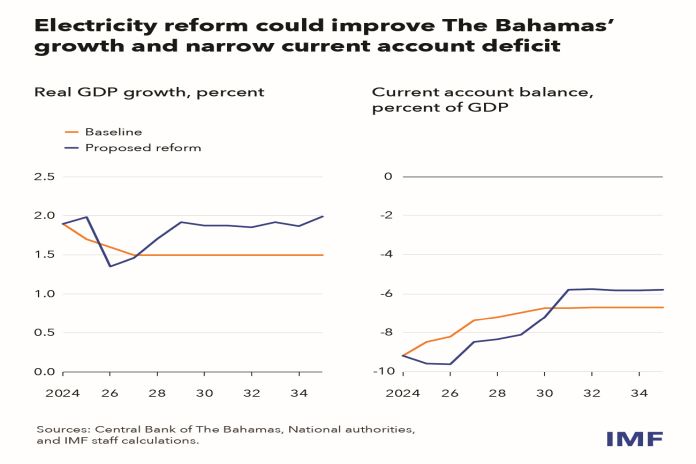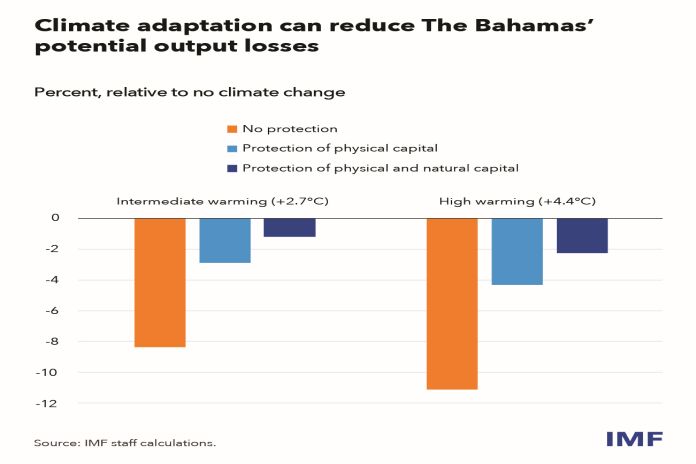By Zamid Aligishiev, Beatriz Garcia-Nunes and Shane Lowe
Modernizing electricity grids and increasing the shares of solar energy and liquified natural gas (LNG) in electricity production can yield major macroeconomic benefits in The Bahamas. Such transformations, over the medium-term, could reduce fossil fuel imports, decrease the country’s vulnerability to volatile global fuel prices, significantly reduce CO2 emissions, and substantially boost national output (eventually increasing long-run growth potential from 1.5 percent to 2 percent). These are just some of the many interesting findings using the IMF’s new Renewable Energy Balance of Payments tool. This tool estimates the impact of a shift in the mix of energy production on a country’s transactions with the rest of the world.
An ambitious energy transformation
For years, Bahamians have suffered from frequent power outages, while the reliance on imported fossil fuels—one of the highest in the Caribbean—for electricity generation leaves consumers and businesses vulnerable to high and volatile energy prices.

To address these hardships, the government announced plans in June 2024 to, in partnership with the private sector, invest in a modern electricity transmission and distribution infrastructure and to increase the share of renewable energy in its mix of electricity generation. Specifically, the government is taking advantage of the abundance and intensity of solar energy available to The Bahamas all year round by increasing the share of solar energy to 30 percent by 2030. Investing in solar also minimizes the adverse environmental impact and logistical challenges associated with other forms of energy. A small share of electricity will still be produced using diesel, but much will be replaced with cleaner LNG.
While a transformation of this magnitude can be expensive, the government’s partnerships with private power producers and investors can help The Bahamas to achieve its mitigation goals. The transition to a greener electricity mix, while meeting growing electricity demand, requires multi-year investments which are expected to be financed by the private sector. However, carefully managing fiscal risks will be necessary to avoid adding to the government’s already-highly public debt.
Investing in resilience
Unfortunately, even with these investments, the threat of climate change is here to stay. IMF analysis suggests that rising sea levels could place up to 41 percent of the land in The Bahamas and 22 percent of its population below sea level by the end of this century. Moreover, the country is positioned within the Atlantic hurricane belt, leaving it at high risk of hurricane damage. Left unaddressed, more severe natural disasters and slow-moving impacts from climate change could reduce The Bahamas’ national output by up to 11 percent by 2100, with larger losses in the islands whose economies rely most on hospitality and real estate.

Given these risks, investing in The Bahamas’ capacity to adapt to climate change and preserve its natural capital could increase national output by up to 9 percent over the long-term, including through sustainable tourism. Building resilience to climate change would require diversifying away from vulnerable activities as well as undertaking investments to protect physical assets and natural capital (for example, breakwater construction, coral reef and mangrove protection, and beach nourishment programs).
Investing in climate resilience can be expensive, with financing needs exceeding those of the energy transformation. Fortunately, the ongoing electricity sector reform, if executed successfully, can serve as a blueprint for how countries can partner with private businesses to finance climate adaptation. Moreover, innovative financing solutions, including by refinancing expensive debt with cheaper funding, could free additional public resources to preserve the country’s natural habitats. The private sector can play a vital role in financing climate resilience, working hand-in-hand with the public sector and supported by the international community (including in the form of grants). By working together, this trio of partners can help small states like The Bahamas secure a prosperous future for their citizens and protect their natural beauty and capital for future generations to enjoy.
****
Zamid Aligishiev and Shane Lowe are economists in the IMF’s Western Hemisphere Department. Beatriz Garcia-Nunes is a research analyst in the IMF’s Western Hemisphere Department.









